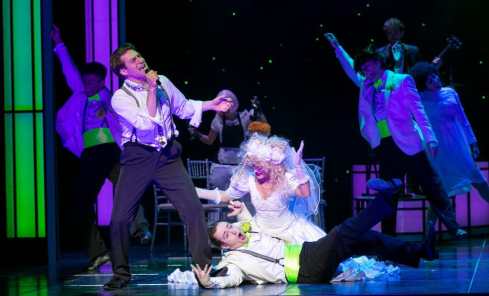SUMMER HOLIDAY
New Alexandra Theatre, Birmingham, Wednesday 13th June, 2018
The 1963 Cliff Richard film about a bunch of lads who travel across Europe in a London double-decker bus is now a vehicle, haha, for Ray Quinn and a ball of energy shaped liked the rest of the cast. The minimal set, apart from the bus of course, gives them plenty of space to dance in – and boy, do they dance! Quinn is an incredible mover – they all are – and director Racky Plews’s quirky 1960s choreography pulls no punches. The staging of the musical numbers is a spectacular display of talent and skill. It’s breath-taking and fun – fun being the watchword of this effortlessly likeable show.
There are plenty of iconic songs (the title song, Do You Wanna Dance?, The Young Ones, and so on) and some nondescript ones, but these are salvaged and redeemed by the energetic staging. The script by Michael Gyngell and Mark Haddigan is charmingly funny, cheeky rather than smutty; it’s all light-hearted stuff, and I forgive the odd anachronisms (like ‘anger management’) because I’m having too good a time to care.
Like I said, as Don, the Cliff role, Quinn is incredible. Even his speaking voice is mannered to suit the period and he seems to chuck himself around with ease. He is supported by his mates: Rory Maguire is funny as Cyril; Billy Roberts is funny as Steve, in a low-brow kind of way; and Joe Goldie is funny – no, make that hilarious – as Edwin, especially when he’s attempting to mime. They meet a trio of girls in France, on their way to stardom in Athens, and guess what, they’re all funny too, even if there’s not much to differentiate their characters other than hair colour. The girls’ numbers are real treats. I like Alice Baker’s Alma, Laura Marie Benson’s Angie, and particularly enjoy Gabby Antrobus’s Mimsie.
Adding drama to the bus ride is the marvellous Sophie Matthew as Barbara, starlet on the run, bringing Shakespearean transvestite intrigue when she stows away on the bus disguised as a boy (she’s in disguise, not the bus). As well as being glamorous and elegant, Matthew is also funny – there’s a great scene when Quinn is towelling off after a shower and asks the ‘boy’ to assist. Quinn is in impressive shape, by the way, and his cheeky smile is never far away.
Villain of the piece is Barbara’s pushy showbiz mother Stella, played to the hilt by Taryn Sudding. The Muttley to her Dick Dastardly is none other than veteran entertainer Bobby Crush, having and being great fun under a dreadful toupee. Crush proves himself a fine comic actor as the long-suffering Jerry; the delivery of his lines and the timing of his reactions is spot on.
This is relentless entertainment, harking back to a more innocent time and kept fresh and alive by an indefatigable company. I leave the theatre with a big grin plastered over my face – and there’s not many bus journeys that have that effect.



